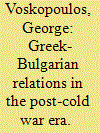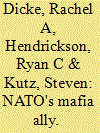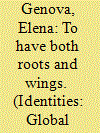|
|
|
Sort Order |
|
|
|
Items / Page
|
|
|
|
|
|
|
| Srl | Item |
| 1 |
ID:
085310


|
|
|
|
|
| Publication |
2008.
|
| Summary/Abstract |
The Balkan Peninsula has been an unstable regional security subsystem because of a number of defining and qualitative parameters, namely, overt or covert challenges to the territorial status, interethnic conflicts, the "great idea" syndrome, out-of-system interference, and minority expansionism. In the post-Cold War era, European Union enlargement in the area assisted the establishment of a core of systemic stabilizers that could, under certain conditions, absorb inherent instability. Greece and Bulgaria constitute an axis providing eufunctional input to the regional stability and security equation. Their partnership has been an example of inter-Balkan cooperation and an effort to establish an equilibrium mechanism to enhance the cohesion of the region
|
|
|
|
|
|
|
|
|
|
|
|
|
|
|
|
| 2 |
ID:
133996


|
|
|
|
|
| Publication |
2014.
|
| Summary/Abstract |
By a number of accounts, NATO's membership expansion has been viewed favorably, with many analysts pointing to the positive impact NATO's enlargement has on the democratic development of civil-military relations across Central and Eastern Europe. Within this context, Mosès Naím's recent essay in Foreign Affairs was especially striking due to his piercing criticism of Bulgaria due to its significant problems with internal domestic corruption. We examine the potential impact of a Bulgarian mafia-oriented society on NATO from three perspectives, which include assessments of Bulgaria's military, its military capabilities-including its recent weapons purchases-as well as its willingness and ability to participate in NATO's major operations. In our view, these measures provide at least a partial assessment of Bulgaria's role within the alliance in an era that parallels claims of widespread corruption. The findings suggest that Bulgaria's corruption does have some impact on its ability to contribute to NATO's major alliance objectives, which apart from the deleterious impact on Bulgaria, also has broader implications for NATO's ongoing interest in membership expansion.
|
|
|
|
|
|
|
|
|
|
|
|
|
|
|
|
| 3 |
ID:
091597


|
|
|
|
|
| Publication |
2009.
|
| Summary/Abstract |
The main purpose of this article is to establish to what extent migration from Bulgaria and Romania to Spain first, has a temporary and circulatory or a long-term and permanent nature, and secondly, responds to family or individual strategies. Several indicators are analysed: demographic composition; family reunification processes; migratory strategies within the family framework; the age of immigrants' children; and the frequency of movements between the destination and origin. The article demonstrates that many immigrants do not follow family reunification strategies but rather adopt individual strategies and that long term migration is the predominant pattern.
|
|
|
|
|
|
|
|
|
|
|
|
|
|
|
|
| 4 |
ID:
145863


|
|
|
|
|
| Summary/Abstract |
Bulgarian migrants and university students in particular have recently fallen into the spotlight of British media, firmly positioned within fervent immigration debates. Drawing on Brewer’s concept of nested identities, this paper explores how Bulgarian university students in the UK manage four different identifications: national, European, migrant and student. Thus, the process of establishing nested identities is investigated on three different contextual levels: the transnational, regional and the everyday (at university and at the workplace). Paying particular attention to the factors that influence the process, this article also scrutinises its implications for Bulgarian students’ values and perceptions. Utilising semi-structured interviews and participant observation with Bulgarian students, this paper will argue that the four identifications emerge as highly dynamic, context-specific and constantly negotiated relationships. Retrospectively, this article aims to contribute not only to current literature on Bulgarian migration but also to wider debates on transnational youth identities.
|
|
|
|
|
|
|
|
|
|
|
|
|
|
|
|
|
|
|
|
|